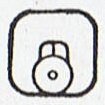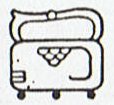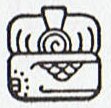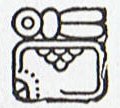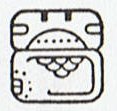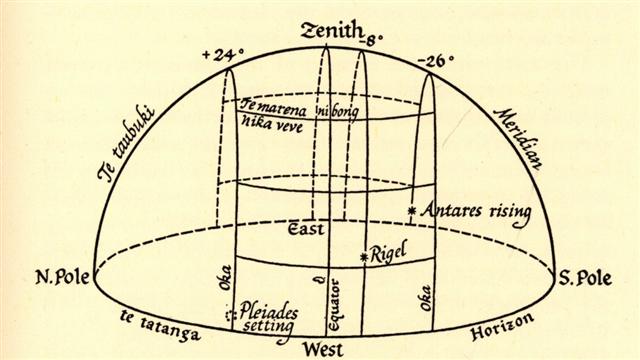|
2. The spear could once have been imagined as thrown into the fiery eye of Sun. Or it could have been an arrow, or a sling-stone. The wished for result was presumably to avoid more heat, which was threatening to dry up all the little waters of the earth causing drought: ... 'The rays drink up the little waters of the earth, the shallow pools, making them rise, and then descend again in rain.' Then, leaving aside the question of water, he summed up his argument: 'To draw up and then return what one had drawn - that is the life of the world.' The result of such a dramatic action would surely be rainclouds and the crack of thunder (with a bolt piercing the old oak) - implying new life:
At the opposite end of the cycle Sun had to be put in charge again (recharged) to stop the long dark chilly dormant part of the year. Also this necessitated a weapon capable of reaching high up. According to the G text (as we have come to understand it) there is a vero season at the end of September:
When using a map for the stars defined by an observer north of the equator it is close at hand to also use a calendar from the north. Basically Coma Berenices would then refer to the beginning of autumn (when Sun is falling on his face). However, counting feathers in the head gear at Kissin we find the number is presumably meant to be 13 + 13 = 26 (not 24), which I guess is a Sign pointing at Antares:
26 refers to Sun. Next follows 27 which refers to Moon. September 27 is day 270 from January 1. Sun is no longer present north of the equator. When Coma Berenices is rising with Sun, his true face will no longer be there. To see Coma Berenices another time of the year must be chosen. From heliacal rising to midnight culmination there are 136 days and this measure seems to have been engraved on the G tablet:
Honu in Ga5-25 (where 52 * 5 = 260) could be pointing at the heliacal rising of the front side of the year 136 days earlier. Puo in Gb8-30 (together with Hyadum II) is rising heliacally in May 25, where once again the numbers are 5 and 25:
May 27 is here connected with a tagata glyph and with 475 = 19 * 25. The star Ain is ε Tauri and the name means Bull's Eye. This reminds me of Polyphemos: ... Odysseus and his fleet were now in a mythic realm of difficult trials and passages, of which the first was to be the Land of the Cyclopes, 'neither nigh at hand, nor yet afar off', where the one-eyed giant Polyphemus, son of the god Poseidon (who, as we know, was the lord of tides and of the Two Queens, and the lord, furthermore, of Medusa), dwelt with his flocks in a cave. 'Yes, for he was a monstrous thing and fashioned marvelously, nor was he like to any man that lives by bread, but like a wooded peak of the towering hills, which stands out apart and alone from others.' Odysseus, choosing twelve men, the best of the company, left his ships at shore and sallied to the vast cave. It was found stocked abundantly with cheeses, flocks of lambs and kids penned apart, milk pails, bowls of whey; and when the company had entered and was sitting to wait, expecting hospitality, the owner came in, shepherding his flocks. He bore a grievous weight of dry wood, which he cast down with a din inside the cave, so that in fear all fled to hide. Lifting a huge doorstone, such as two and twenty good four-wheeled wains could not have raised from the ground, he set this against the mouth of the cave, sat down, milked his ewes and goats, and beneath each placed her young, after which he kindled a fire and spied his guests. Two were eaten that night for dinner, two the next morning for breakfast, and two the following night. (Six gone.) But the companions meanwhile had prepared a prodigous stake with which to bore out the Cyclops' single eye; and when clever Odysseus, declaring his own name to be Noman, approached and offered the giant a skin of wine, Polyphemus, having drunk his fill, 'lay back', as we read, 'with his great neck bent round, and sleep that conquers all men overcame him.' Wine and fragments of the men's flesh he had just eaten issued forth from his mouth, and he vomited heavy with drink. 'Then', declared Odysseus, I thrust in that stake under the deep ashes, until it should grow hot, and I spake to my companions comfortable words, lest any should hang back from me in fear. But when that bar of olive wood was just about to catch fire in the flame, green though it was, and began to glow terribly, even then I came nigh, and drew it from the coals, and my fellows gathered about me, and some god breathed great courage into us. For their part they seized the bar of olive wood, that was sharpened at the point, and thrust it into his eye, while I from my place aloft turned it about, as when a man bores a ship's beam with a drill while his fellows below spin it with a strap, which they hold at either end, and the auger runs round continually. Even so did we seize the fiery-pointed brand and whirled it round in his eye, and the blood flowed about the heated bar. And the breath of the flame singed his eyelids and brows all about, as the ball of the eye burnt away, and the roots thereof crackled in the flame. And as when a smith dips an ax or adze in chill water with a great hissing, when he would temper it - for hereby anon comes the strength of iron - even so did his eye hiss round the stake of olive. And he raised a great and terrible cry, that the rock rang around, and we fled away in fear, while he plucked forth from his eye the brand bedabbled in much blood. Then maddened with pain he cast it from him with his hands, and called with a loud voice on the Cyclopes, who dwelt about him in the caves along the windy heights. And they heard the cry and flocked together from every side, and gathering round the cave, called in to ask what ailed him. 'What hath so distressed thee, Polyphemus, that thou criest thus aloud through the immortal night, and makest us sleepless? Surely no mortal driveth off thy flocks against thy will: surely none slayeth thyself by force or craft?' And the strong Polyphemus spake to them again from out of the cave: 'My friends, Noman is slaying me by guile, nor at all by force.' And they answered and spake winged words: 'If then no man is violently handling thee in thy solitude, it can in no wise be that thou shouldst escape the sickness sent by mighty Zeus. Nay, pray thou to thy father, the lord Poseidon.' On this wise they spake and departed; and my heart within me laughed to see how my name and cunning counsel had beguiled him ... Odysseus did not use an ash but a stake of Olive, because it was a creature of the back side of the year which had to be defeated:
|
